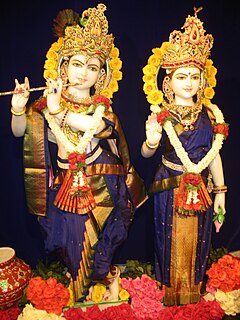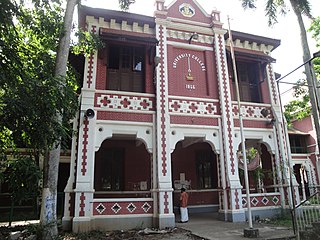
Chattampi Swamikal was a Hindu sage and social reformer. His thoughts and work influenced the launching of many social, religious, literary and political organisations and movements in Kerala and for the first time gave voice to those who were marginalised.
Gopala was the founder of the Pala dynasty of Bihar and Bengal regions of the Indian Subcontinent. The last morpheme of his name Pala means "protector" and was used as an ending for the names of all the Pala monarchs. Pala does not suggest or indicate any ethnic or caste considerations of the Pala dynasty. He came to power around 750 CE in Gaur / Gwal after being elected by a group of regional chieftains.

Kanakku Chembakaraman Kesava Pillai (1868–1914) was an Indian composer of Carnatic music and a poet of Malayalam literature. He was the Poet Laureate of Travancore and was known for Kesaveeyam, a mahakavya in Malayalam, two attakathas and several bhajans and kirtans. He also translated the Sanskrit text, Narayaniyam, into Malayalam under the title, Bhashanarayaniyam.

Visakham Thirunal Rama VarmaFRAS was the Maharaja of the erstwhile Indian kingdom of Travancore from 1880–1885 AD. He succeeded his elder brother Maharajah Ayilyam Thirunal to the throne of Travancore.

Gopala Dasa (1721–1769) was a prominent 18th-century Kannada language poet and saint belonging to the Haridasa tradition. With other contemporary Haridasas such as Vijaya Dasa and Jagannatha Dasa, Gopala Dasa propagated the Dvaita philosophy of Madhvacharya in South India through Kirtans known as Dasara Padagalu with the pen-name "Gopala Vittala".He is Ganesa Amsha.

Gopāla-Tāpanī Upanishad is a Sanskrit text, and one of the later Upanishad attached to the Atharvaveda. The Gopāla-Tāpanī is one of the four Tāpinī Upanishads.

G. Kamalamma, (1930–2012) was a school teacher for most of her professional life, and was an author, mostly in the spheres of language and literature, socio-cultural subjects and biography. She wrote over 30 books, all in the Malayalam language, and won citations and awards from both the Sahitya Academy of India and the Sahitya Academy of Kerala.

Elanthoor is a village in Pathanamthitta district of the Southern State of Kerala, India. Situated half way between Kozhencherry and Pathnamthitta, the area was part of the Kingdom of Travancore presumably since 1820. This peaceful rural belt has a significant place in the history of the freedom movement of the country and has made notable contributions to the film industry. It has been argued that the expression "Ellangalude Oor" shortened by over has become "Elanthoor". "Ellangalude Oor" would mean "aggravation of settlements" or a region of concentration of houses.

Jagannatha Dasa (1728–1809), a native of Manvi town in the Raichur district, Karnataka state, India,is a disciple of Madhvacharya and is considered one of the notable Haridasa of Dvaita Vedanta of Madhva saint-poets of the Kannada language. Apart from authoring numerous well-known devotional songs that propagate the Vaishnava bhakti ("faith") of Dvaita Vedanta of Madhvacharya, Jagannatha Dasa wrote the Harikathamritasara in the native shatpadi metre and Tattva suvali in the native tripadi metre. He was also an accomplished scholar in the Sanskrit language.

Sooranad P. N. Kunjan Pillai was an Indian, researcher, lexicographer, poet, essayist, literary critic, orator, grammarian, educationist, and scholar of the Malayalam language, best remembered for his contributions in compiling Malayala Maha Nighantu, a lexicon. The Government of India awarded him the fourth highest civilian honour of the Padmashri in 1984 for his contribution to Malayalam literature and education. He was also a recipient of the Vallathol Award in 1992 and when the Government of Kerala instituted the Ezhuthachan Puraskaram, their highest literary honour in 1993, he received the inaugural award.
G. Gangadharan Nair is a Sanskrit scholar and a pioneer in the field of spoken Sanskrit. He has a PhD in Sanskrit grammar and Master of Arts degrees in Russian and Sanskrit. He has taught in Sanskrit colleges and universities. He was the research guide of Fathima Beevi, "the first Muslim lady to get her PhD in Vedanta ".

University College, Thiruvananthapuram (UCT) is a constituent college of the University of Kerala, based primarily in Thiruvananthapuram, the capital of the Indian state of Kerala. The college was awarded 23rd rank by National Institutional Ranking Framework, NIRF in 2019 and 2020.

Rai Bahadur Thandalam Gopala Rao was an Indian educator who, along with William Archer Porter, was responsible for the growth of the Government Arts College, Kumbakonam in its early stages.

Gopala Pillai Sankara Pillai, better known as G. Sankara Pillai, was an Indian playwright, literary critic, and director, known to be one of the pioneers of modern Malayalam theatre. A proponent of total theater, he was the founder of Nataka Kalari movement in Kerala and the chairman of the Kerala Sangeeta Nataka Akademi. He was a recipient of a number of awards including the Kerala Sahitya Akademi Award for Drama in 1964 for the work Rail Palangal and the Sangeet Natak Akademi Award for the best playwright in 1979.
Ammayenna Sthree is a 1970 Indian Malayalam film, directed by K. S. Sethumadhavan. The film stars Prem Nazir, Sathyan, K. R. Vijaya and Ragini in the lead roles. The film has musical score by A. M. Rajah.
Achaaram Ammini Osharam Omana is a 1977 Indian Malayalam-language film directed by Adoor Bhasi, written by P. K. Sarangapani, and produced by Boban Kunchacko. The film stars Prem Nazir, Jayan, Sheela and Sukumari in the lead roles. The film has musical score by G. Devarajan.

Kurissery Gopala Pillai was an orientalist, researcher, lexicographer, poet, essayist, grammarian and scholar of Malayalam and Sanskrit languages. He specialised in Comparative study of languages.
Kerala Gauthameeyam is a book on Tarka sastra written in Malayalam language by Kurissery Gopala Pillai. First published in 1959, it is the pioneering work on Tarka sastra in Malayalam. Another significant effort in this direction is Kaikkulangara Rama Variar's Mukthaavali. Authorship of this book gave the title 'Kerala Gauthaman' to Gopala Pillai who was a poet, researcher and scholar of Malayalam and Sanskrit languages.

Dr. G. Prabha is a retired professor of Sanskrit, writer, film-maker and former journalist based in Chennai, Tamil Nadu, India.












